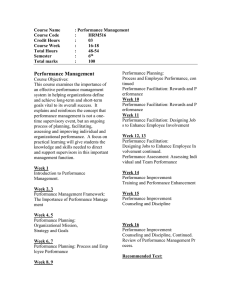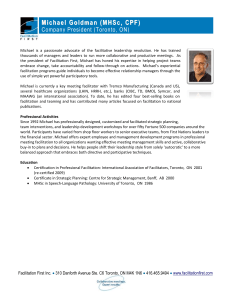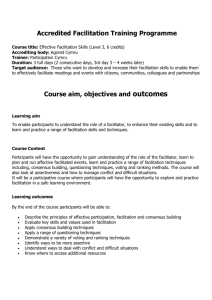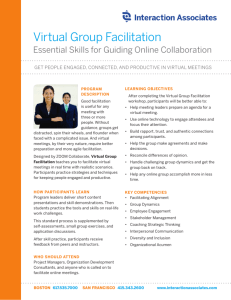Handling Difficult Facilitation Situations
advertisement
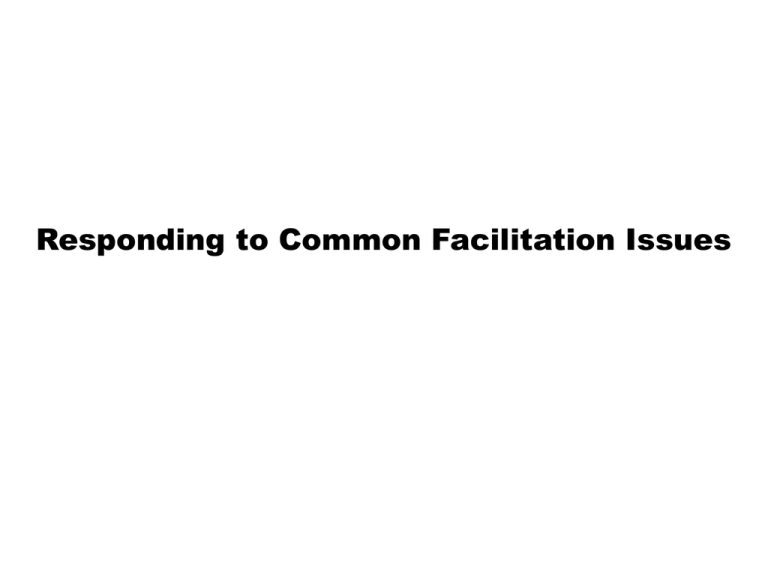
Responding to Common Facilitation Issues Common Facilitation Issues: Tangents Tangents represent ideas and communication that only peripherally relate to the topic of focus. Facilitation techniques and tricks: • Ask how the tangential topic is relevant to the current discussion – There may be a link you are unaware of • Set a ground rule that allows the group to quickly identify tangential issues and move on – Empower group members to call out “tangent” or “rat hole” • Create a “parking lot” or location where no directly relevant information and ideas are recorded – This serves to validate the person who brought the issue up and it ensure that you will have the idea down if it become relevant later Common Facilitation Issues: Side bars Side bars are conversations among a sub-set of participants that take place during the larger group’s communication; often they are disturbing. Facilitation techniques and tricks: • Initially use non-verbal signs to signal disapproval – Longer glances, gradually physically approach the people talking • Kindly, but commandingly, ask the speakers to rejoin the group – “We want to be sure everyone is focused on what we are currently discussing…” • Refer back to your ground rules about listening and respect • If necessary, call a break and pull the talkers aside to discuss Common Facilitation Issues: Dominators A dominator is someone who unjustifiably takes up more than his/her fair share of speaking time. Facilitation techniques and tricks: • Initially use non-verbal signs to signal disapproval – Longer glances, gradually physically approach the people talking • Politely interrupt the speaker and ask someone else to speak – “I hear your point on ‘x,’ and I would like to hear what Shelly thinks.” • Refer back to your ground rules about listening and respect • Assign the dominator a role that will occupy his/her time – It is hard to take minutes and talk at the same time • If necessary, call a break and pull the dominator aside to discuss Common Facilitation Issues: Apathy Apathy may affect one or more members of a group. The tell-tale signs include little involvement and support. Facilitation techniques and tricks: • At the beginning of your meeting, ask participants what they hope to gain from the group’s work. Alternatively or additionally, have them identify how they will benefit. • Consider the meeting’s context and change accordingly – Time of day…are participants tired or stressed? – Biological needs…are participants hungry, too hot, etc.? • Investigate power and status issues among your group members – Some people do not act unless their boss is around – Other do not act because their boss is around Common Facilitation Issues: Hidden Agenda Hidden agendas are unspoken desires individuals bring with them to meetings that may or may not have anything to do with the meeting’s purpose or content. Facilitation techniques and tricks: • Seek input from those familiar with the person(s) you are concerned with in an attempt to identify the hidden agenda(s). • If necessary, call a break and pull the person aside to discuss • Refer back to your ground rule about focus and concerted effort toward the group’s goal • If appropriate, call out the hidden agenda – “No one will get fired for sharing their true thoughts.” Facilitation Topics 1. Reduce the speed limit 2. Require school uniforms in all public high schools 3. Raise the drinking age 4. Raise the retirement age for collecting Social Security 5. Implement sex segregated classes in public high school 6. Require public service for college graduation 7. Institute compulsory voting in national elections 8. Allow people not born in the US to run for President 9. Require all new cars to be hybrids
